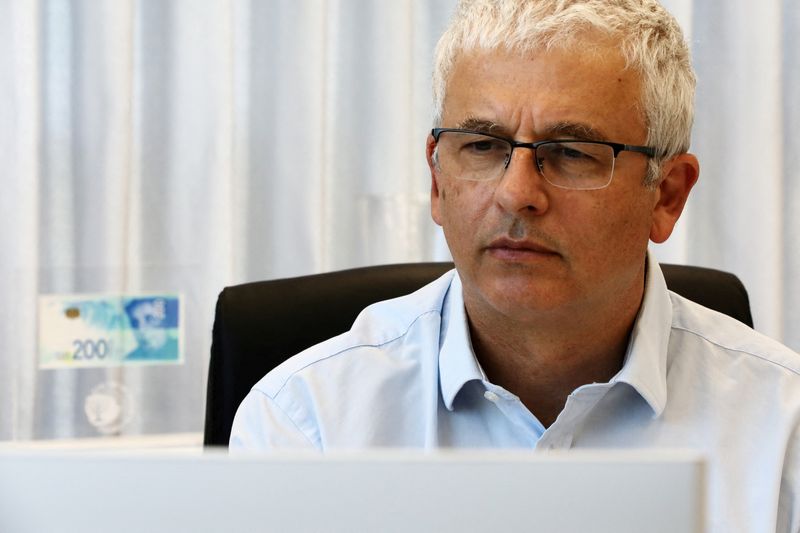By Steven Scheer
JERUSALEM (Reuters) - The Bank of Israel (BOI) remains committed to plans for a digital shekel currency to improve Israel's payments system and foster innovation, but is unlikely to launch one ahead of other advanced economies.
"We’re all waiting for the first western central bank to pull the trigger, which is almost certainly going to be the ECB. And then you may see a rush of countries going forward with it," Bank of Israel Deputy Governor Andrew Abir told Reuters.
As of March, 134 countries representing 98% of the global economy were exploring digital versions of their currencies, which would eventually replace cash. Some countries, such as China, are in advanced stages of pilot programs, while the U.S. Federal Reserve is lagging.
The BOI first began looking into a possible central bank digital currency (CBDC) in 2017 as a way of creating a more efficient payments system and stepped up its research and preparation in November 2020.
The bank has been experimenting with a digital shekel along with its Hong Kong, Swedish and Norwegian counterparts, as well as the Bank for International Settlements. It has invited both fintech and traditional financial companies to participate in its project, known as the "Digital Shekel Challenge" to demonstrate possible use cases.
Despite the planning and an increasingly digital global economy, the BOI still says it cannot be sure it will ultimately launch a digital shekel. Its experiment is considered an "action plan" to be ready when the bank deems appropriate and necessary.
Similarly, the ECB has said it is likely, but not inevitable, that a digital euro would be introduced in Europe, which is dependent on cross-border payment services from elsewhere, particularly U.S. giants Visa (NYSE:V) and Mastercard (NYSE:MA).
"The big question is whether the public will adopt a digital currency," Abir said, adding the BOI is doing a behavioural study on the subject.
QUESTIONS OVER TAKE UP
"There’s a big jump from some study to persuading people to use it. You have to have a good set of use cases."
Abir wants an eventual digital currency to pay interest to create competition with bank deposits and provide an incentive for the public to hold it.
Israel's banking system is highly concentrated, with two large banks dominating more than 60% of the market.
"The main incentive for us is to create a level playing field for payment providers and allow them to compete with the banks," he said.
"An advantage of a CBDC is that the payment provider does not hold your money so you don’t (have) a credit exposure to that company. This allows a lower level of supervision and capital requirement than a traditional payments provider that holds your money, even for brief moments in time."
A digital shekel, Abir said, will allow the public to pay with the central bank's money "everywhere and in any transaction we choose."

Should the BOI decide to launch a digital shekel, it would most likely need approval from the finance and justice ministries.
"It will take time before it enters all of our lives if we decide to implement it," Abir said. "But it has the potential to be the next revolution in payment systems."